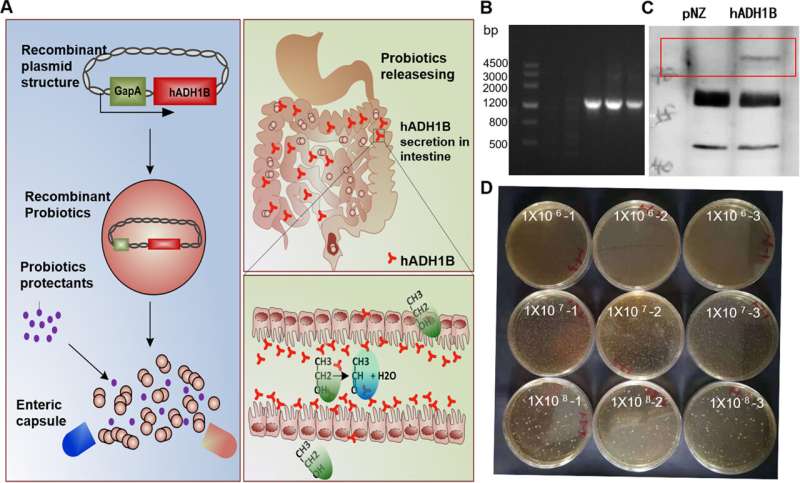This article has been reviewed according to Science X's editorial process and policies. Editors have highlighted the following attributes while ensuring the content's credibility:
fact-checked
trusted source
proofread
A protective probiotic blunts the ill effects of alcohol in mice

Excessive alcohol consumption leads to painful hangovers and accompanying headaches, fatigue and nausea. Drinking alcohol has also been linked to a raft of health problems in the human body, including heart disease, cirrhosis and immune deficiency. One way to avoid those consequences would be to drink less, but researchers in China have introduced another way to mitigate hangovers and other adverse outcomes—a genetically-engineered probiotic.
In a paper published this week in Microbiology Spectrum, the researchers described their approach and reported that in experiments on mice, the treatment reduced alcohol absorption, prolonged alcohol tolerance and shortened the animals' recovery time after exposure to alcohol. The probiotic hasn't yet been tested on humans, but the authors predicted that if it confers the same benefits, it could present a new way to reduce alcohol-induced health problems, and liver problems in general.
Meng Dong, Ph.D, at the Chinese Academy of Science's Institute of Zoology, who worked on the study, noted that clinical applications may extend beyond alcohol-related conditions. "We believe that genetically engineered probiotics will provide new ideas for the treatment of liver diseases," she said.
The human body primarily uses forms of an enzyme called alcohol dehydrogenase, or ADH, to metabolize alcohol. But some variants are more effective than others. Some studies have found that a form called ADH1B, found primarily in East Asian and Polynesian populations, is 100 times more active than other variants. Previous studies in mice have shown that viral vectors genetically engineered to express ADH1B can accelerate the breakdown of alcohol, but that approach hasn't been shown to be safe in humans.
Motivated by those findings, Dong and her colleagues looked for a safer delivery method, focusing on the probiotic Lactococcus lactis, a bacterium often used in fermentation. They used molecular cloning to introduce the gene for human ADH1B into a bacterial plasmid, which was then introduced into a strain of L. lactis. Lab tests confirmed that the probiotic secreted the enzyme. The researchers encapsulated the probiotic to ensure it would survive against stomach acid, then tested it on three groups of five mice, each exposed to different levels of alcohol.
Untreated mice showed signs of drunkenness 20 minutes after exposure to alcohol. When the mice were placed on their backs, for example, they were unable to get back on their feet. But in the group that received a probiotic that expressed human ADH1B, half the mice were still able to turn themselves over one hour after alcohol exposure. A quarter never lost their ability to turn themselves over.
Further tests showed that two hours after exposure, blood alcohol levels in the control group continued to rise, while those in the probiotic-treated mice had begun to fall. In addition, the researchers found that treated mice showed lower levels of lipids and triglycerides in their livers, suggesting that the probiotic could alleviate alcohol-related damage to that organ.
The next step, Dong said, is to investigate whether the potential therapeutic effect of the modified probiotic extends to humans. "We are excited about the improvement of recombinant probiotics in acute alcohol-induced liver and intestinal damage," Dong said.
More information: Xiaoxiao Jiang et al, Oral Probiotic Expressing Human Ethanol Dehydrogenase Attenuates Damage Caused by Acute Alcohol Consumption in Mice, Microbiology Spectrum (2023). DOI: 10.1128/spectrum.04294-22
Provided by American Society for Microbiology



















